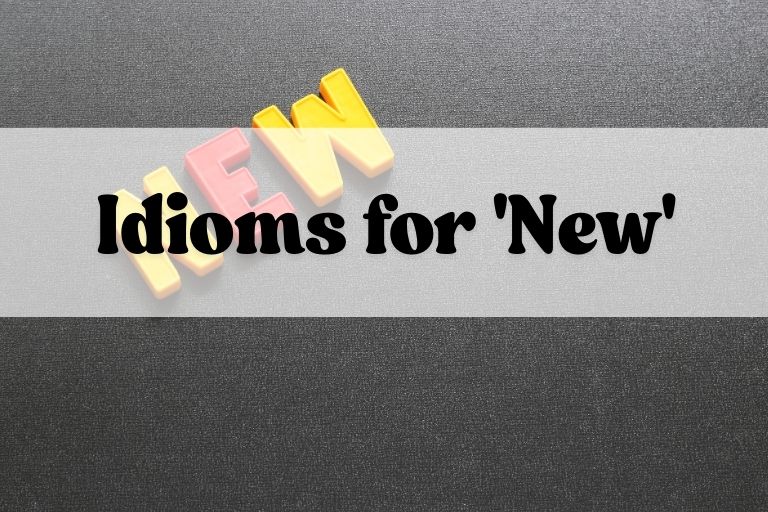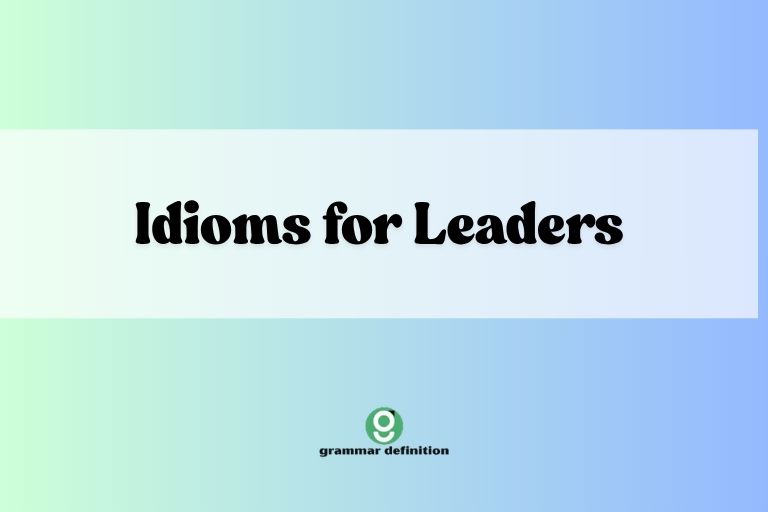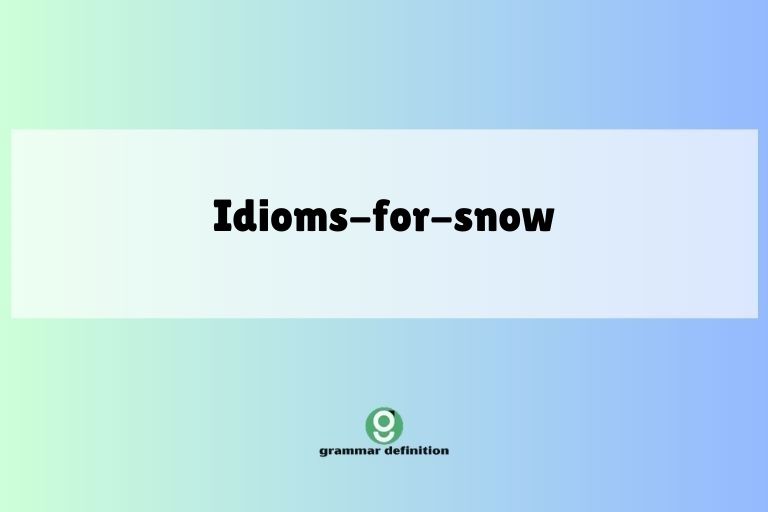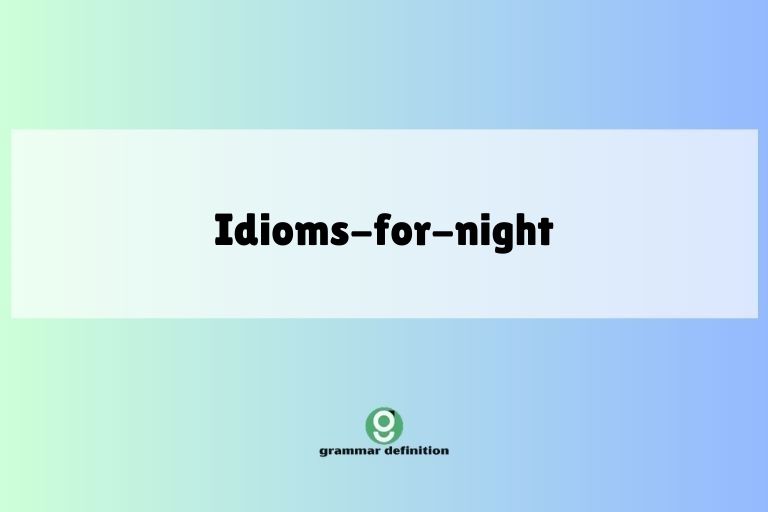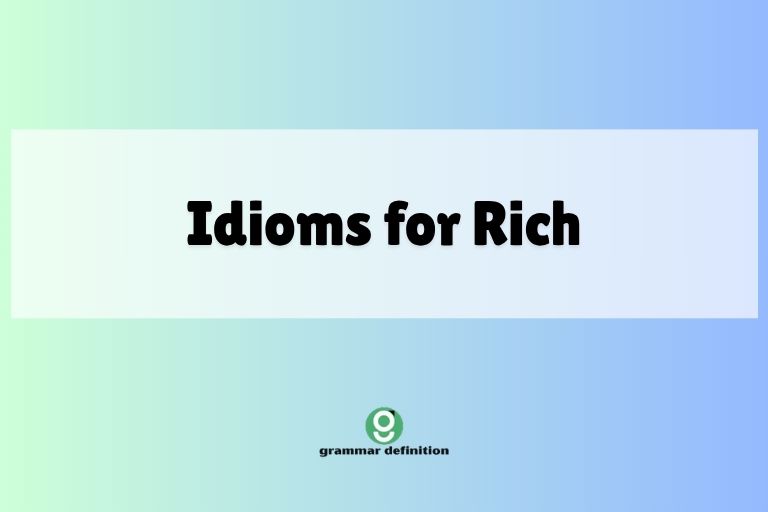Idioms for Birds: A Comprehensive Guide for English Learners
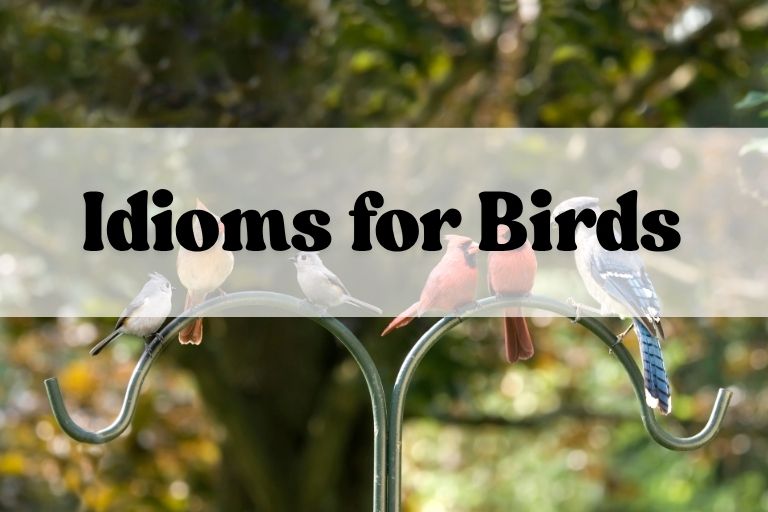
Idioms are a fascinating aspect of the English language, adding color and depth to our communication. Among the many categories of idioms, those related to birds are particularly vivid and frequently used.
Understanding these idioms can significantly enhance your comprehension and fluency in English. This article provides a comprehensive exploration of bird-related idioms, their meanings, origins, and usage, suitable for English learners of all levels.
Table of Contents
- Introduction
- Definition of Idioms and Bird-Related Idioms
- Structural Breakdown of Bird Idioms
- Types and Categories of Bird Idioms
- Examples of Bird Idioms
- Usage Rules for Bird Idioms
- Common Mistakes When Using Bird Idioms
- Practice Exercises
- Advanced Topics in Bird Idioms
- Frequently Asked Questions
- Conclusion
Introduction
Idioms are phrases or expressions whose meanings cannot be understood from the literal definitions of the individual words. They are a crucial part of mastering any language, and English is no exception.
Bird-related idioms, in particular, offer a rich tapestry of metaphorical meanings. This article aims to equip you with the knowledge and skills to understand and use these idioms effectively.
Whether you’re a beginner or an advanced learner, this guide will provide valuable insights into the world of bird idioms, helping you to express yourself more naturally and confidently.
Definition of Idioms and Bird-Related Idioms
An idiom is a phrase or expression whose meaning is different from the literal meaning of its individual words. Idioms are often culturally specific and add nuance and color to language. Understanding idioms is essential for comprehending spoken and written English, as they are frequently used in everyday conversation, literature, and media.
Bird-related idioms are a subset of idioms that use birds as metaphors to convey specific meanings. These idioms often draw on the characteristics and behaviors of different birds to represent human traits, situations, or emotions. For instance, an idiom might use the image of a bird flying freely to represent freedom or independence.
These idioms function as fixed expressions, meaning their structure and wording are generally not flexible. Changing the words or their order can alter or destroy the idiom’s intended meaning.
Classification of Bird Idioms
Bird idioms can be classified based on their metaphorical meaning. Some common categories include:
- Freedom and Independence: Idioms that use birds to represent liberty or autonomy.
- Warning and Caution: Idioms that use birds to signal danger or the need for vigilance.
- Foolishness and Naivety: Idioms that associate certain birds with being gullible or unwise.
- Luck and Opportunity: Idioms that use birds to signify good fortune or a favorable chance.
- Appearance and Behavior: Idioms that use birds to describe someone’s looks or actions.
Function of Bird Idioms
Bird idioms serve several functions in communication:
- Adding Color and Interest: They make language more engaging and expressive.
- Conveying Complex Ideas Simply: They can communicate abstract concepts in a concise and relatable way.
- Reflecting Cultural Values: They often reveal cultural attitudes and beliefs about birds and their symbolic meanings.
Contexts for Using Bird Idioms
Bird idioms are appropriate in various contexts, including:
- Informal Conversations: They are common in everyday speech among friends and family.
- Creative Writing: They can add depth and imagery to stories, poems, and other literary works.
- Journalism: They can be used to make news articles more engaging and accessible.
- Speeches and Presentations: They can help to capture the audience’s attention and make the message more memorable.
Structural Breakdown of Bird Idioms
Bird idioms, like all idioms, often defy simple grammatical analysis. Their meaning is derived from the whole phrase rather than the individual words.
However, understanding the basic structural elements can help in recognizing and interpreting them.
Most bird idioms consist of a combination of the following elements:
- A Noun (Bird): This is the central element, referring to a specific bird or birds in general.
- A Verb: This describes an action or state related to the bird.
- Prepositions and Articles: These connect the noun and verb, forming a complete phrase.
- Adjectives and Adverbs: These modify the noun or verb, adding detail and nuance to the idiom’s meaning.
For example, in the idiom “a bird in the hand is worth two in the bush,” the noun is “bird,” the verbs are “is” and “worth,” and the prepositions are “in” and “of.” The entire phrase conveys the idea that it is better to hold onto something certain than to risk losing it by trying to get something better.
Bird idioms often follow common grammatical patterns, such as:
- Subject-Verb-Object: “Kill two birds with one stone.”
- Prepositional Phrases: “As free as a bird.”
- Comparative Structures: “Eat like a bird.”
Types and Categories of Bird Idioms
Bird idioms can be categorized based on the specific bird mentioned and the meaning conveyed. Here are some common types:
Eagle Idioms
Eagles are often associated with strength, vision, and leadership. Idioms involving eagles typically convey these qualities.
Owl Idioms
Owls are symbols of wisdom and knowledge. Idioms featuring owls often relate to intelligence or insight.
Chicken Idioms
Chickens are often associated with cowardice or timidity. Idioms involving chickens usually convey these traits.
Parrot Idioms
Parrots are known for their ability to mimic sounds and words. Idioms featuring parrots often relate to imitation or repetition without understanding.
General Bird Idioms
These idioms use the general concept of birds to convey various meanings, such as freedom, opportunity, or warning.
Examples of Bird Idioms
This section provides a comprehensive list of bird idioms, categorized by their metaphorical meaning, along with examples of their usage in sentences.
Freedom and Independence
The following table lists idioms that use birds to represent freedom or independence.
| Idiom | Meaning | Example Sentence |
|---|---|---|
| As free as a bird | Completely free and unconstrained. | After finishing her exams, she felt as free as a bird. |
| Spread one’s wings | To become independent and try new things. | When she moved to a new city, she felt ready to spread her wings. |
| Fly the coop | To escape or leave a confined situation. | They decided to fly the coop and travel the world. |
| A bird in flight | Represents ultimate freedom and spontaneity. | Her spirit was like a bird in flight, never tied down. |
| Have wings to fly | To have the opportunity and ability to be free. | With her new degree, she had wings to fly and pursue her dreams. |
| Free bird | Someone who is independent and doesn’t want to be tied down. | He’s a free bird; he doesn’t like relationships. |
| Take wing | To fly away; to depart suddenly. | The rumors quickly took wing and spread throughout the office. |
| On the wing | In flight; flying. | We saw several birds on the wing during our walk. |
| Give someone wings | To empower someone and enable them to achieve their dreams. | Her encouragement gave him the wings he needed to succeed. |
| Soar like an eagle | To rise high and achieve great success. | With his talent and hard work, he will soar like an eagle in his career. |
| Uncaged bird | Represents freedom after being previously confined. | After leaving the demanding job, she felt like an uncaged bird. |
| Roam like a bird | To wander freely without restrictions. | He loves to roam like a bird, exploring new places every chance he gets. |
| Take to the skies | To pursue freedom and adventure. | After years of planning, they finally took to the skies in their own plane. |
| Bird of passage | Someone who travels from place to place, not staying long in any one place. | She’s a bird of passage, always moving on to the next adventure. |
| Wing and a prayer | To do something with little or no preparation or resources, relying on luck. | They finished the project with just a wing and a prayer. |
| Wild as a hawk | Describes someone who is untamed and fiercely independent. | He was as wild as a hawk, refusing to conform to society’s expectations. |
| Open wings | To embrace opportunities and freedom. | She approached the new job with open wings, ready for any challenge. |
| Break free like a bird | To escape a restrictive situation and find liberation. | He decided to break free like a bird from his monotonous routine. |
| Free-flying spirit | Describes someone with an uninhibited and independent nature. | Her free-flying spirit made her a fascinating person to be around. |
| Take flight | To leave a place, especially suddenly. | The entire flock of birds took flight as we approached. |
| On the fly | Doing something quickly and without planning. | I had to make the presentation on the fly because I hadn’t prepared. |
| The early bird catches the worm | This idiom emphasizes the benefits of starting something early. | I woke up early to get a good spot at the concert; the early bird catches the worm. |
Warning and Caution
The following table lists idioms that use birds to signal danger or the need for vigilance.
| Idiom | Meaning | Example Sentence |
|---|---|---|
| A little bird told me | Someone told me a secret, but I won’t reveal who. | A little bird told me that you’re getting promoted. |
| Like a canary in a coal mine | An early warning of danger. | The company’s declining sales were like a canary in a coal mine, indicating deeper problems. |
| As the crow flies | The shortest distance between two places (often used to indicate a potentially misleading distance). | As the crow flies, it’s only 50 miles, but the road is much longer. |
| Watch like a hawk | To observe very carefully. | The security guard watched the store like a hawk. |
| Birds of ill omen | Harbingers of bad news or misfortune. | The black clouds gathering overhead were birds of ill omen. |
| Eagle eye | Someone with keen vision and attention to detail. | The accountant had an eagle eye for spotting errors. |
| Crow’s feet | Wrinkles around the eyes, often associated with aging. | She didn’t mind the crow’s feet; they were a sign of a life well-lived. |
| Hawk-eyed | Having sharp vision and attention to detail. | The hawk-eyed detective noticed the subtle clue immediately. |
| Under the eagle’s wing | Under the protection and guidance of someone powerful. | The young apprentice worked under the eagle’s wing of the master craftsman. |
| A bird’s-eye view | A view from above, providing a broad perspective. | From the top of the mountain, we had a bird’s-eye view of the valley. |
| Raven’s warning | A signal or omen of impending doom. | The dark clouds and sudden silence felt like a raven’s warning. |
| Like a sitting duck | Vulnerable and easily targeted. | Without proper security, the company was like a sitting duck for hackers. |
| Owl’s hoot | Often associated with a warning or ghostly presence. | The owl’s hoot in the distance sent a shiver down her spine. |
| Beware of false feathers | Be cautious of outward appearances that may be deceiving. | In the world of politics, you must beware of false feathers. |
| When birds fly low | A sign of impending bad weather. | The sailors knew to prepare for a storm when birds fly low. |
| A bird’s whisper | A secret or rumor that should be heeded but cannot be traced. | A bird’s whisper suggested the company was on the brink of collapse. |
| Watch the sparrow fall | Implies a need to be vigilant of small signs that indicate larger problems. | The manager told his team to watch the sparrow fall to avoid missing critical issues. |
| Hawk’s shadow | The presence of a threat or danger lurking nearby. | The company felt the hawk’s shadow as competitors circled. |
| Keep a weather eye out | To be watchful and prepared for potential problems. | The captain told the crew to keep a weather eye out for approaching storms. |
| Sound the alarm | To give a warning of danger or trouble. | When they discovered the error, they sounded the alarm immediately. |
Foolishness and Naivety
The following table lists idioms that associate certain birds with being gullible or unwise.
| Idiom | Meaning | Example Sentence |
|---|---|---|
| Bird-brained | Stupid or foolish. | That was a bird-brained idea to go swimming in the freezing water. |
| Swallow something hook, line, and sinker | To believe a story completely without questioning it. | He swallowed the con artist’s story hook, line, and sinker. |
| Silly goose | A playful term for someone who is being foolish. | “You forgot your keys again, silly goose!” she said with a smile. |
| Like a headless chicken | Acting in a frantic and disorganized manner. | They were running around like headless chickens trying to meet the deadline. |
| Goose chase | A pointless or fruitless search. | The police investigation turned out to be a goose chase. |
| Chicken feed | A small or insignificant amount of money. | To him, the fine was chicken feed. |
| Chicken-hearted | Cowardly or lacking courage. | He was too chicken-hearted to ask her out. |
| Parrot fashion | Repeating words or phrases without understanding their meaning. | The students were just reciting the information parrot fashion. |
| As daft as a brush | Extremely foolish or silly. | He’s as daft as a brush if he thinks that will work. |
| Pea-brained | Stupid or unintelligent. | Only a pea-brained idiot would do something like that. |
| Empty nest | A feeling of loneliness when children leave home. | She experienced empty nest syndrome when her youngest child went to college. |
| Scatterbrained | Disorganized and forgetful. | She’s so scatterbrained that she often forgets where she put her keys. |
| Lost duckling | Someone who appears lost and confused, often naive. | The new intern looked like a lost duckling on his first day. |
| Chicken out | To back out of something due to fear. | He was going to go skydiving, but he chickened out at the last minute. |
| Goosey | Silly or nervous. | She gets goosey before giving presentations. |
| A sitting target | An easy target, vulnerable to attack. | Without the proper security measures, the company was a sitting target for hackers. |
| Out to lunch | Absent-minded or not paying attention. | He seemed totally out to lunch during the meeting. |
| Not the sharpest tool in the shed | Not very intelligent. | He’s a nice guy, but he’s not the sharpest tool in the shed. |
| Take someone for a ride | To deceive or swindle someone. | The salesman took him for a ride with that overpriced car. |
| Easily led | Easily influenced or manipulated. | He’s too easily led; he believes everything he hears. |
Luck and Opportunity
The following table lists idioms that use birds to signify good fortune or a favorable chance.
| Idiom | Meaning | Example Sentence |
|---|---|---|
| A bird in the hand is worth two in the bush | It’s better to hold onto something certain than to risk losing it by trying to get something better. | I was tempted to quit my job for a new opportunity, but a bird in the hand is worth two in the bush. |
| Early bird catches the worm | The person who takes the earliest opportunity will be the most successful. | I arrived at the store before it opened; the early bird catches the worm. |
| As lucky as a lark | Extremely lucky. | She won the lottery; she’s as lucky as a lark. |
| Golden goose | A valuable asset or source of wealth that should be protected. | The company’s new product line was their golden goose. |
| Feather one’s nest | To enrich oneself, often dishonestly. | The corrupt politician feathered his nest with public funds. |
| Find a feather | To discover a sign or clue that leads to a greater opportunity. | The detective found a feather at the scene, a clue in the complex case. |
| Every bird loves to hear himself sing | People enjoy hearing their own voices or opinions. | He always dominates the conversation; every bird loves to hear himself sing. |
| Hatch a plan | To devise a plan, often in secret. | They hatched a plan to surprise their friend for his birthday. |
| Sing like a canary | To confess or reveal information, often under pressure. | The suspect sang like a canary when the police showed him the evidence. |
| Rare bird | A unique or exceptional person or thing. | She’s a rare bird; I’ve never met anyone quite like her. |
| Pluck a feather | To take a small advantage or gain from an opportunity. | He managed to pluck a feather from the deal, securing a small bonus. |
| The goose hangs high | Indicates that things are going well or that there is prosperity. | With the new contract in place, the goose hangs high for the company. |
| As welcome as flowers in May | Very welcome and appreciated. | After a long winter, the sunshine was as welcome as flowers in May. |
| Opportunity knocks but once | You should take advantage of opportunities when they arise. | He knew he had to seize the moment; opportunity knocks but once. |
| Strike while the iron is hot | To take advantage of an opportunity immediately. | They decided to launch the product now; they wanted to strike while the iron was hot. |
Appearance and Behavior
The following table lists idioms that use birds to describe someone’s looks or actions.
| Idiom | Meaning | Example Sentence |
|---|---|---|
| Eat like a bird | To eat very little. | She eats like a bird and never gains weight. |
| For the birds | Worthless or uninteresting. | That movie was strictly for the birds. |
| Proud as a peacock | Very proud and vain. | He was as proud as a peacock after winning the award. |
| Night owl | Someone who stays up late and is active at night. | I’m a night owl; I do my best work after midnight. |
| Sly as a fox | Cunning and deceitful. | He’s as sly as a fox; you can’t trust him. |
| Ugly duckling | Someone who is unattractive at first but later blossoms into beauty. | She was an ugly duckling in high school, but now she’s stunning. |
| Fit as a fiddle | In excellent physical condition. | He’s 80 years old but as fit as a fiddle. |
| As different as chalk and cheese | Completely different. | They are as different as chalk and cheese. |
| Make a beeline for | To go straight to someone or something. | She made a beeline for the dessert table. |
| Wolf in sheep’s clothing | Someone who appears harmless but is actually dangerous. | He seemed friendly, but he was a wolf in sheep’s clothing. |
| As quiet as a mouse | Very quiet. | The children were as quiet as mice during the movie. |
| Like water off a duck’s back | Having no effect. | Criticism rolls off her like water off a duck’s back. |
| All one’s geese are swans | To think that everything one owns or does is wonderful. | He thinks all his geese are swans; he’s so proud of everything he does. |
| An odd bird | Someone who is strange or eccentric. | He’s a bit of an odd bird, but he’s harmless. |
| As blind as a bat | Having very poor eyesight. | Without his glasses, he’s as blind as a bat. |
| The bane of one’s existence | Something or someone that causes great annoyance or trouble. | That broken printer is the bane of my existence. |
| Have a frog in one’s throat | Having difficulty speaking due to a sore throat. | I have a frog in my throat; I need some water. |
| A cold fish | Someone who is unemotional and unfriendly. | He’s a cold fish; he never shows any emotion. |
| Happy as a clam | Very happy and content. | She was as happy as a clam at the beach. |
| A social butterfly | Someone who is outgoing and enjoys socializing. | She’s a social butterfly; she knows everyone at the party. |
Usage Rules for Bird Idioms
Using bird idioms correctly requires understanding their specific meanings and contexts. Here are some general rules to follow:
- Understand the Meaning: Before using an idiom, make sure you understand its precise meaning. Using it incorrectly can lead to confusion or miscommunication.
- Consider the Context: Bird idioms are not appropriate in all situations. Use them in informal conversations, creative writing, or other contexts where figurative language is acceptable.
- Use the Correct Form: Idioms are fixed expressions, so it’s important to use the correct wording and structure. Changing the words or their order can alter or destroy the idiom’s meaning.
- Be Aware of Cultural Differences: Some bird idioms may be culturally specific, and their meanings may not be universally understood. Be mindful of your audience and avoid using idioms that may be unfamiliar or offensive.
- Practice Regularly: The best way to master bird idioms is to practice using them in your own speech and writing. Pay attention to how native speakers use idioms and try to incorporate them into your own vocabulary.
Common Mistakes When Using Bird Idioms
Learners often make mistakes when using bird idioms. Here are some common errors to avoid:
| Incorrect | Correct | Explanation |
|---|---|---|
| As free like a bird | As free as a bird | The correct idiom is “as free as a bird,” not “as free like a bird.” |
| Spread his wings | Spread one’s wings | The idiom “spread one’s wings” is used to refer to anyone. |
| Fly from the coop | Fly the coop | The correct idiom is “fly the coop,” not “fly from the coop.” |
| A little bird said to me | A little bird told me | The correct idiom is “A little bird told me”. |
| Early bird gets the worm | The early bird catches the worm | The correct idiom is “The early bird catches the worm”. |
| Eating like a chicken | Eat like a bird | The correct idiom is “Eat like a bird”. |
Practice Exercises
Test your understanding of bird idioms with these practice exercises.
Exercise 1: Fill in the Blanks
Fill in the blanks with the correct bird idiom from the list below.
Idiom List: As free as a bird, fly the coop, a little bird told me, watch like a hawk, bird-brained, early bird catches the worm, eat like a bird, proud as a peacock
| Question | Answer |
|---|---|
| 1. After finishing her exams, she felt ___________. | As free as a bird |
| 2. They decided to __________ and travel the world. | Fly the coop |
| 3. __________ that you’re getting promoted. | A little bird told me |
| 4. The security guard __________ the store. | Watched like a hawk |
| 5. That was a __________ idea. | Bird-brained |
| 6. The __________ gets the worm. | Early bird catches the worm |
| 7. She ___________ and never gains weight. | Eats like a bird |
| 8. He was __________ after winning the award. | Proud as a peacock |
| 9. The company’s new product line was their __________. | Golden goose |
| 10. She’s a __________; I’ve never met anyone quite like her. | Rare bird |
Exercise 2: Multiple Choice
Choose the correct meaning of the bird idiom in each sentence.
| Question | Options | Answer |
|---|---|---|
| 1. It’s better to have a bird in the hand than two in the bush. What does this mean? | (a) It’s better to take risks. (b) It’s better to hold onto something certain. (c) Birds are valuable. | (b) It’s better to hold onto something certain. |
| 2. He chickened out of the competition. What does this mean? | (a) He won the competition. (b) He backed out due to fear. (c) He trained hard for the competition. | (b) He backed out due to fear. |
| 3. The news came as a complete shock out of the blue. What does this mean? | (a) Expected (b) Predictable (c) Unexpected | (c) Unexpected |
| 4. She’s a night owl. What does this mean? | (a) She likes to sleep early. (b) She’s active at night. (c) She’s afraid of the dark. | (b) She’s active at night. |
| 5. That movie was for the birds. What does this mean? | (a) The movie was entertaining. (b) The movie was worthless. (c) The movie was about birds. | (b) The movie was worthless. |
| 6. After the merger, the company was a golden goose. What does this mean? | (a) The company would face financial ruin. (b) The company was a valuable possession. (c) The company was poorly managed. | (b) The company was a valuable possession. |
| 7. He’s been feathering his nest for years. What does that mean? | (a) He’s been wasting money. (b) He’s been working hard to help others. (c) He’s been enriching himself, often dishonestly. | (c) He’s been enriching himself, often dishonestly. |
| 8. She watches her investments like a hawk. What does that mean? | (a) She is very careful with her investments. (b) She ignores her investments. (c) She is very unlucky with her investments. | (a) She is very careful with her investments. |
| 9. The rumors took wing quickly. What does that mean? | (a) The rumors were true. (b) The rumors spread rapidly. (c) The rumors were about birds. | (b) The rumors spread rapidly. |
| 10. He’s as different as chalk and cheese. What does that mean? | (a) They are very similar. (b) They are completely different. (c) They are both useful. | (b) They are completely different. |
Exercise 3: Sentence Completion
Complete the following sentences using the appropriate bird idiom from the list. Each idiom should be used only once.
Idiom List: Make a beeline for, wolf in sheep’s clothing, Like water off a duck’s back, an
odd bird, proud as a peacock, a little bird told me, eat like a bird, fly the coop
| Question | Answer |
|---|---|
| 1. He tried to insult her, but the criticism was __________. | Like water off a duck’s back |
| 2. She always __________ the coffee machine as soon as she arrives at the office. | Make a beeline for |
| 3. I heard from a secret source, __________, that they are planning to merge the departments. | a little bird told me |
| 4. Be careful; he may seem nice, but he’s a __________. | wolf in sheep’s clothing |
| 5. She barely touches her food; she __________ . | eats like a bird |
| 6. Ever since he got promoted, he’s been as __________ . | proud as a peacock |
| 7. He always seemed like __________ with his unusual habits and quirky personality. | an odd bird |
| 8. They decided to __________ and start a new life in another country. | fly the coop |
Advanced Topics in Bird Idioms
For advanced learners, exploring the origins and cultural significance of bird idioms can provide a deeper understanding of the English language.
Etymology of Bird Idioms
Many bird idioms have interesting etymological origins, often dating back centuries. Understanding these origins can shed light on the historical and cultural contexts in which the idioms arose.
Cultural Significance of Bird Idioms
Bird idioms often reflect cultural attitudes and beliefs about birds and their symbolic meanings. Different cultures may associate different qualities with specific birds, leading to variations in the meanings and usage of bird idioms.
Regional Variations in Bird Idioms
Like all idioms, bird idioms can vary regionally. Some idioms may be more common in certain parts of the English-speaking world than others.
Being aware of these regional variations can help you to communicate more effectively with people from different backgrounds.
Frequently Asked Questions
What is the difference between an idiom and a metaphor?
An idiom is a phrase whose meaning is different from the literal meaning of its individual words, while a metaphor is a figure of speech that directly compares two unrelated things.
How can I improve my understanding of bird idioms?
Read widely, listen to native speakers, and practice using bird idioms in your own speech and writing.
Are bird idioms used in formal writing?
Bird idioms are generally more appropriate for informal writing and speech. In formal writing, it’s best to use more direct and literal language.
Can I create my own bird idioms?
While it’s possible to create new idioms, they may not be widely understood or accepted. It’s generally best to use established idioms that are already part of the English language.
Why are bird idioms so common in English?
Birds have long been a source of fascination and inspiration for humans, and their behaviors and characteristics lend themselves well to metaphorical expression.
Conclusion
Bird idioms are a colorful and expressive part of the English language. By understanding their meanings, origins, and usage, you can enhance your comprehension and fluency, and communicate more effectively in a variety of contexts.
Whether you’re a beginner or an advanced learner, mastering bird idioms will add a new dimension to your English language skills.

